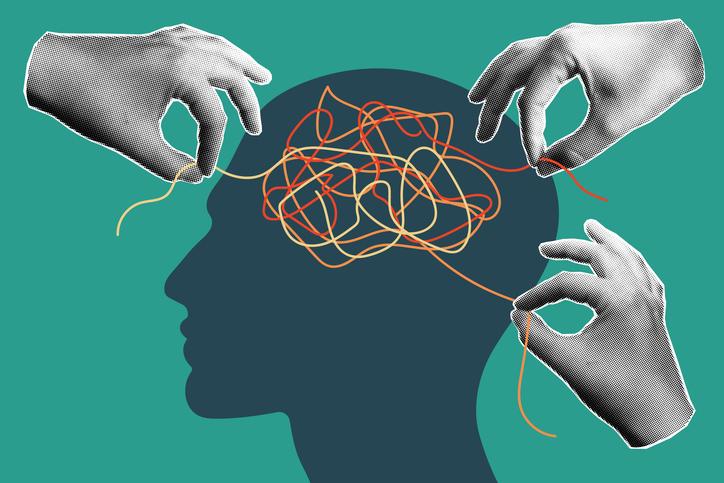Graduate apprenticeships are work-based degrees that allow people in full-time employment to gain a university qualification. Introduced in Scotland in 2016, these programmes have already benefited tens of thousands of learners, addressing critical skills shortages in fields from engineering to digital technology. Policymakers have set ambitious targets for expanding graduate apprenticeships to strengthen the workforce, and employers have eagerly embraced the model as a pipeline for talent.
However, amid the celebration of skills gains and career outcomes, one crucial aspect has been largely overlooked: the human cost. Graduate apprenticeship students themselves are under intense pressure – and their mental health is often the silent casualty.
- Three ways to spot someone struggling – and six ways to support them
- A student mental health crisis awaits. Here’s how we avoid a bad fall
- Building a culture of care to support students’ mental health
Unlike a traditional undergraduate, a graduate apprenticeship student juggles full-time employment, academic coursework and often family or personal obligations all at once. The time and energy demands of this dual role are enormous. Even for a new university student, adjusting to higher workload and self-directed learning is challenging; add a minimum 21-hour working week into the mix and it can become overwhelming.
Many graduate apprenticeship students attend classes on day-release or during evenings, leaving them little or no downtime. Campus life, from joining study groups to socialising with peers, is often minimal. This schedule can breed isolation. Little surprise, then, that stress levels run high. In Scotland, 72 per cent of students cited their first year of study as a time when they had concerns about their mental health and well-being, research found. In other words, many graduate apprenticeship students may be struggling without any obvious support network taking note.
The toll on mental health
The consequences of these pressures are increasingly apparent. Anxiety is a common companion for graduate apprenticeship students worried about meeting deadlines, performing at work and succeeding academically all at once. Over time, constant stress and lack of balance can fuel depression, as exhaustion and a sense of isolation set in.
Without intervention, burnout – a state of physical and mental exhaustion – is a real risk for graduate apprenticeship students who can go years without a break, juggling work-based projects and coursework back to back. Compounding the problem, students often do not reach out for help. They might not realise what resources are available from universities based on the limited time they have on campus, adding to the feeling of disconnection between themselves and universities while undertaking their graduate apprenticeship degree programme. In short, the mental health challenges linked to graduate apprenticeships are both broad and deep – and they cannot be left for individual students to navigate alone.
Shared responsibility for support
If there is a silver lining, it’s the growing recognition that student mental health is not an individual issue but a collective responsibility. Tackling the well-being challenges of graduate apprenticeship students requires a tripartite approach involving universities, employers and the apprentices’ designated mentors and tutors. No single support mechanism will suffice; rather, everyone connected to a graduate apprenticeship has a role to play in creating a safety net for the student.
Universities offering graduate apprenticeship programmes are being urged to take a more proactive approach to supporting their students’ mental health and to reduce the stigma around issues such as anxiety and burnout. This starts with treating graduate apprenticeship students as full-time members of the campus community, even if their time on campus is limited.
Simple steps like facilitating cohort meet-ups or online groups can counteract isolation. For example, at our institution, each graduate apprenticeship student is paired with a dedicated academic link tutor and a year lead coordinator, and apprentices are encouraged to form peer support networks (such as WhatsApp groups for their year) to foster open dialogue. Such peer support is powerful in letting students know they are not alone and in normalising conversations about stress. Staff and students alike can be encouraged to look out for one another – a small but crucial cultural shift that aims to link into the Scottish government’s Student mental health action plan.
Academic link tutors sit at the junction between the university and the workplace, and they are often lifelines for apprentices. These tutors oversee the apprentice’s progress and provide essential pastoral support to those managing study alongside full-time employment. It is vital that link tutors have the capacity and training to notice when a student is struggling and to act.
Crucially, staff should not wait for a struggling student to come forward. Lecturers and tutors who see an apprentice exhibiting signs of distress should be empowered to reach out early, express concern and offer guidance on where to find help. Early intervention can prevent a mounting problem from snowballing into a crisis.
How employers can help
Employers, for their part, must recognise that they share responsibility for their apprentices’ well-being. A graduate apprentice might be an employee, but they are also a student under intense strain. Employers can support them by fostering an understanding workplace culture – one that acknowledges the apprentice’s study commitments and encourages a healthy work–study balance.
The business case for such support is strong: companies that invest in employees’ education tend to see higher loyalty and retention. Organisations offering educational benefits achieved a 94 per cent retention rate among participating employees, according to one report. In other words, when employers support apprentices through the stress of earning that degree, those apprentices are more likely to stay and excel within the company. Well-being support is not an extra – it’s an investment in the future workforce.
Ultimately, the community approach is key. Universities, employers, link tutors, mentors and the students themselves must work in unison to build a culture where seeking help is encouraged and where practical support is readily available. Creating that culture means actively combating isolation – for instance, universities could make a conscious effort to integrate graduate apprenticeship students into campus life with networking events or study spaces for those who are typically off-site. It also means fighting stigma by talking openly about mental health. Every stakeholder should send the message that struggling is not a personal failing and that asking for support is a sign of strength, not weakness.
What needs to be done?
To ensure graduate apprenticeships are truly sustainable, supporting student well-being must become as high a priority as hitting academic targets. There are several steps that universities can take right now to build a more supportive model:
Train staff and workplace mentors to spot distress: Universities should invest in training academic link tutors, lecturers and workplace mentors to recognise signs of anxiety, depression or burnout. Equipping all stakeholders with tools to act early ensures that a struggling apprentice is noticed and helped before problems escalate.
Foster peer support and community: Create opportunities for graduate apprenticeship students to connect with each other as a cohort. Universities can facilitate peer mentor schemes or simple measures like cohort chat groups. Building a sense of community helps prevent isolation and gives apprentices a platform to share experiences and coping strategies.
Make mental health services accessible for apprentices: Universities must adapt their support services to the needs of graduate apprenticeship students. This could include offering counselling or well-being appointments outside of 9–5 hours, or via virtual platforms, so that those working full-time can use them. No apprentice should feel that help is out of reach because of their schedule or location.
Embracing these measures will require commitment, but they are critical for the long-term success of Scotland’s graduate apprenticeship model. Graduate apprenticeships have enormous potential to launch careers and address skill gaps, but that promise will be undermined if we allow mental health to become a determining factor in graduate apprenticeship programmes.
The message is clear: productive learning cannot be sustained without well-being. It is time for universities, employers and all stakeholders to collaborate on robust support structures so that graduate apprenticeship students can thrive in both work and study. By acting now to build a genuine culture of care and early support, we can ensure that no apprentice is left to soldier on alone – and that the next generation of skilled professionals enters the workforce healthy, resilient and ready to succeed.
Gary Gillon is a lecturer in business and management and Alan MacDonald is a lecturer in work-based learning, both at the University of the West of Scotland.
If you would like advice and insight from academics and university staff delivered direct to your inbox each week, sign up for the Campus newsletter.




comment